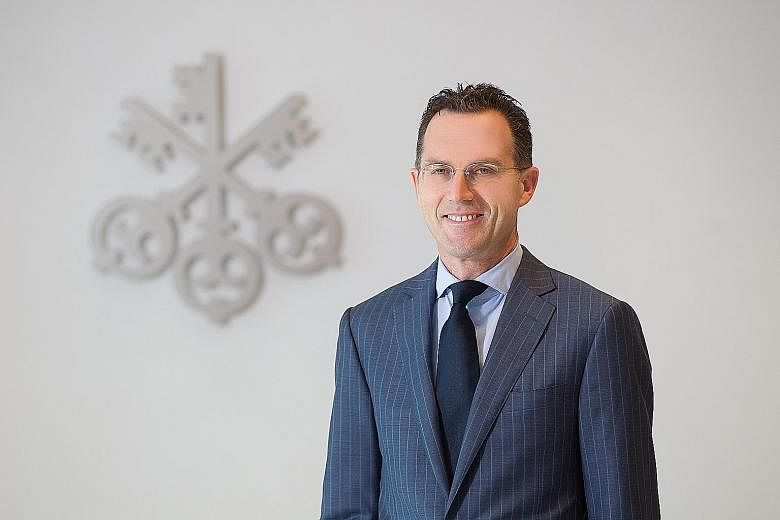Robots, blockchain, artificial intelligence... the list of new-tech innovations battering the finance sector seems endless but there is still one area where the humble human rules supreme - at least for now.
The rarefied world of private banking and wealth management seems to hover above the day to day grind of everyday bank functions, dealing as they do with well-heeled, discreet clientele.
Anyone trusting a bank with millions - billions, even - wants to be sure they are getting the human touch and not just another algorithm. That means someone who looks you in the eye, has a firm handshake and can talk you through the various ways they plan to protect your legacy and grow your money for your progeny.
And yet even within this plush corner of the financial sector, the steady drumbeat of technology is advancing ever louder.
Ask a private bank these days what 2018 will look like and what you get is a glimpse into the cutting-edge: artificial intelligence (AI), robotics process automation (RPA), blockchain, natural language processing, data analytics - the list goes on.
The futuristic talk is in keeping with the Government's vision for Singapore as a wealth management hub. In its industry transformation map for financial services launched in late October, the Monetary Authority of Singapore noted that one of its key ambitions is to develop Singapore into a centre of excellence for wealth management technology and innovation.
It also wants to work with industry players to deepen Singapore's talent pool to provide comprehensive, high-quality wealth advisory solutions.
UBS head of wealth management South-east Asia August Hatecke says all this is also in line with what clients want. "Based on industry surveys, Asia's wealthy have shown a preference for wealth managers with digital innovations.
"Clients in today's world are more entrepreneurial, globally connected and digitally savvy. They want to interact with their bank wherever they are and whenever they want."
Of course, this is not to say that humans are being phased out of private banking. Rather, the banks say clients are demanding that their relationship managers deliver services to them in more innovative and efficient ways that can only be done by investing in the latest technologies.
"We don't envisage a fintech 'Big Bang' within private banking in 2018. Progress will be gradual," says Mr Michael Blake, the chief executive of private banking Asia at Union Bancaire Privee.
"A large proportion of wealthy clients... continue to emphasise the importance of having a relationship manager whom they trust to deliver nuanced advice customised to their specific circumstances."
ROBOTS IN THE BACK-END
At Credit Suisse, for example, robotics process automation (RPA) has been rolled out globally in functions such as human resources, compliance and regulatory affairs, and group operations.
In its private banking Asia-Pacific business, it began using RPA this year in areas such as account opening and verification checks, so that "Live Bots" free up time for employees who can now focus on more value-added tasks.
Mr Benjamin Cavalli, Credit Suisse's head of Private Banking South-east Asia and its Singapore chief executive, says the bank will be rolling out RPA further next year, alongside Optical Character Recognition (OCR) solutions.
"This means everything paper-based, such as account opening documentation can be automatically saved into digital archives through scanning technologies," he notes.
"With RPA and OCR in place, Credit Suisse can make further progress in potentially developing our artificial intelligence capabilities."
And AI is really the ultimate aim.
AI "will enable us to amplify our impact to clients in many ways", Mr Cavalli notes.
"Examples include identifying and delivering insights to clients relating to their portfolios or associated events which might impact their investment decisions, and improving our ability to measure risks for clients and to understand risk across portfolios."
Ms Tan Su Shan, the group head of consumer banking and wealth management at DBS Bank, said the bank has already garnered rich insights using AI, particularly in its retail businesses in India and Indonesia.
"We actively look to translate these insights into applications on our wealth business. While in-house capabilities are continually reviewed and upgraded, we also keep an active look-out for suitable partners that will bring progressive technologies and innovative solutions to boost our digital capabilities."
PORTFOLIO MANAGEMENT SOLUTIONS UP FRONT
While "true" AI is still out of reach, banks have begun working on smart portfolio management solutions to give clients a total view of all their assets, liabilities and investments.
Better yet if the platform can also alert relationship managers if a market event warrants some kind of action for certain clients and what those actions should be.
The aim, as Bank of Singapore (BOS) chief executive Bahren Shaari notes, is to "personalise their relationships with their clients - providing timely, quality personalised advice with deep insights based on past behaviour and market conditions on an automated basis".
Having these platforms is such a big deal that the big players have developed their own in-house. Credit Suisse, for example, developed one named RM Ecosystem, which integrates different applications into the core banking system.
UBS has a similar platform, UBS Advice, that it rolled out earlier this year. Said Mr Hatecke. "It can track pre-set preferences and limits, and is a combination of algorithm-led advice to a client's investment holdings, preferences and risk profile. It offers advice and recommendations when a portfolio strays from pre-set goals, but the decisions are ultimately made by the client."
This man-machine partnership is key, given the existing technology, notes DBS' Ms Tan. "While algorithms are helpful and computational technology have improved dramatically, the financial industry's ability to harness them to assess risk and make sound investment decisions have yet to be satisfactorily developed.
"DBS currently does not deploy algorithms to dynamically rebalance customers' portfolios without overlaying them with human judgment. In the longer term, however, we expect the integration of artificial intelligence and big data to lead to greater maturity of 'robo-advisory'."
DEVELOPING THE HUMAN TOUCH
But even as the robots creep into private banking and wealth management, the human touch will remain just as important as ever before - if not more so, the banks insist.
Indeed, the war for talent remains intense in the private banking industry - experienced relationship managers are in high demand and limited supply.
Morgan Stanley's head of Asian private banking Vincent Chui told Bloomberg last month that the bank's top bankers keep getting poached by family offices set up by the wealthy.
At least 10 relationship managers left this year to head family offices, leaving headcount in Hong Kong and Singapore unchanged from the end of last year, despite plans to grow the number, he said.
As Mr Shaari notes: "We operate in an open market environment where it is no longer a norm for an individual to be staying in the same workplace or doing the same thing throughout his career.
"More often than not, many move on to look for new challenges. This is the reality that all organisations, not just private banks, have to face today."
Given this state of affairs, it is not surprising that banks say they will step up investments in training and development in the new year.
BOS, which has pumped in over US$30 million (S$40 million) into training initiatives and programmes since 2010, will continue to invest in this area.
Among its initiatives is an Advanced Diploma in Private Banking programme which began last year and an Advanced Certificate in Private Banking programme for management associates and support staff launched earlier this year.
At DBS, staff development will continue to focus on creating an environment for people to thrive in the digital economy, says Ms Tan.
"Having experimented with AI and learnt from our various partnerships with fintech companies, our teams are also now trained in agile processes, familiar with running customer-centric journeys and focusing on data as the new currency on which to provide relevant and timely wealth advice and solutions to our customers," she adds.
"We must also ensure that we have the talent that is more adequately equipped to handle the new technology available.
"Current hires will need to be upskilled, and it also means that we will have to hire people who come from non-traditional banking backgrounds such as data scientists, cyber security experts, designers, behavioural scientists, et cetera, people who are in tune with the digital era and can translate data and information to respond to client needs and the jobs needed to be done."



